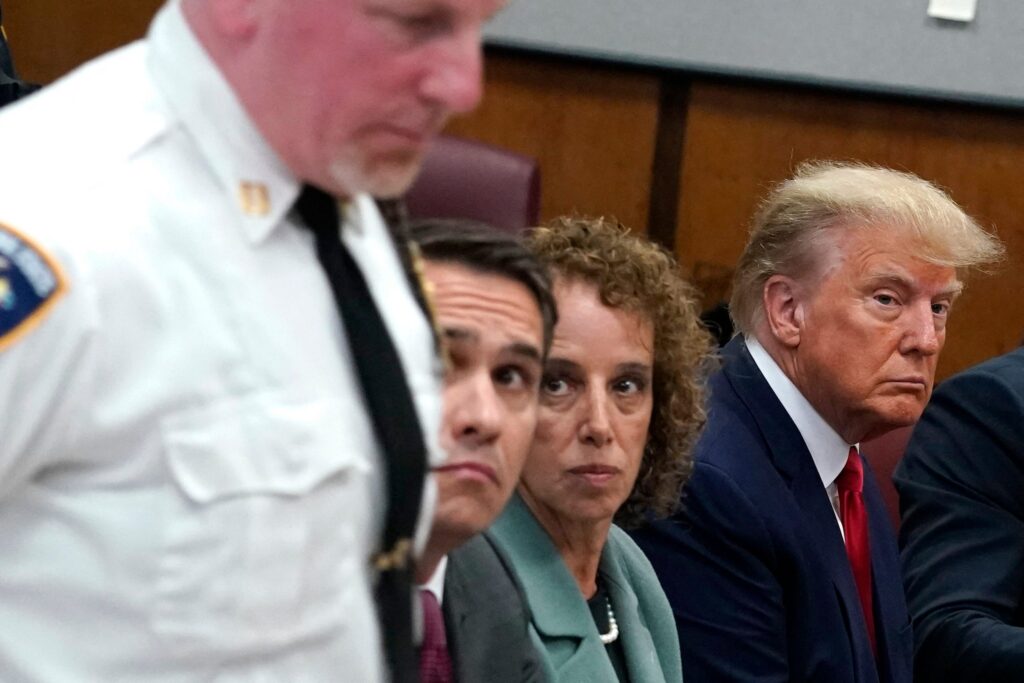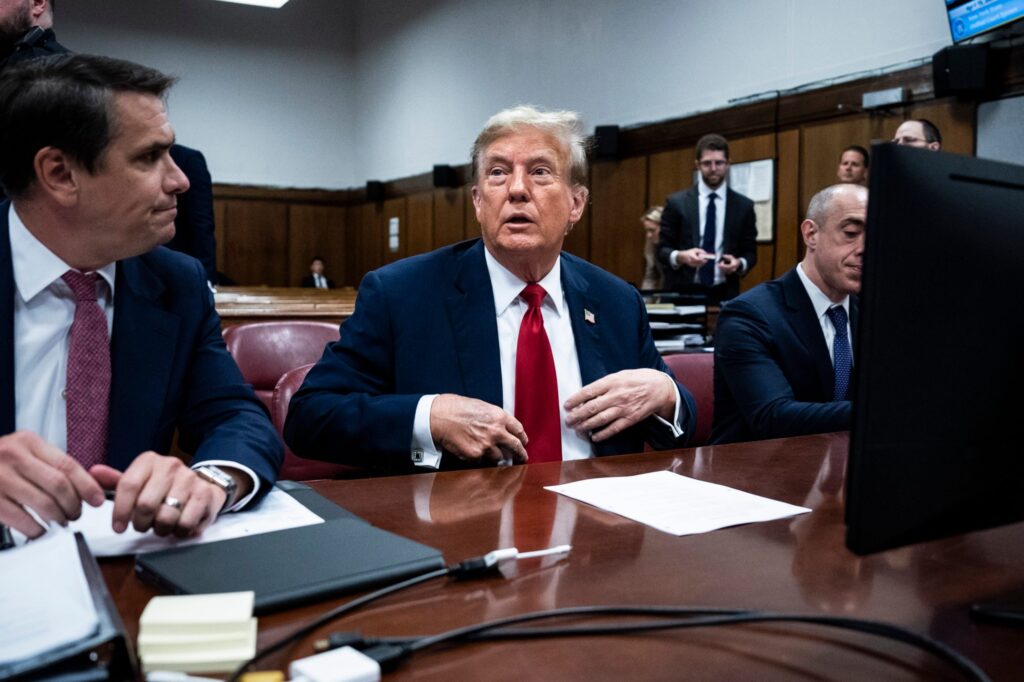- Trump's lawyers were repeatedly bench-slapped on the first day of his trial.
- Trump's lead lawyer, Todd Blanche, suffered a quintet of rebukes for his lawyering.
- New York Supreme Court Justice Juan Merchan called the lawyer at least five times Monday.
It took New York Supreme Court Justice Juan Merchan four hours to dispense with pretrial matters before starting jury selection in his Manhattan hush money trial on Monday.
In that time — and as an international press corps watched and took notes — Trump's lead lawyer, Todd Blanche, suffered a quintet of rebukes for his lawyering.
Merchan didn't hit Blanche as hard as a federal judge in Manhattan hit Trump lawyer Alina Habba for her lawyering. During the E. Jean Carroll defamation trial in January, Judge Lewis Kaplan bench-slapped Habba 14 times during a single day of testimony.
Still, it was a bit brutal. And not the first time for Blanche, either.
Merchan, like prosecutors, may be wearying of Trump's nearly one-dozen trial-delay attempts and what a prosecutor, Joshua Steinglass, on Monday called the defense team's "thousands and thousands of pages of frivolous motions."
Here, in chronological order, are five of Monday's judge-burns — ranging from minor to scorching to merely comical — that would be enough to make any lawyer blanch.
1. "I've noticed that the font has been getting increasingly smaller."
On March 8, Merchan devised a rule to rein in pre-trial motions. He ordered from that day on, instead of filing new motions, the parties needed to ask his permission by first filing what he called a "pre-motion letter."
These pre-motion letters had to describe what relief was being sought, and for what reason, in only a single page. Only if the judge approves can the full motion be filed.
In a minor, humorous burn from early Monday morning, the judge noted with a smile that the defense has kept to the one-page limit. But they did so at the cost of legibility.
"I think that Mr. Blanche is clear now that a pre-motion letter is one page," Merchan began. (Blanche's first pre-motion letter had been filed with a 51-page motion and 214 pages of exhibits attached).
"But I notice that the font has been getting increasingly smaller," and the margins increasingly smaller, too, the judge quipped.
2. "Well, I don't know how you managed to get all those motions filed then."
Later in the morning, the parties argued over trial exhibits. The defense had still not told prosecutors what exhibits they planned to show jurors at trial.
"Amazingly," Steinglass, the prosecutor, complained, "we have yet to receive a single designated exhibit" from the defense.
When Blanche countered that the defense has just been too busy, Merchan hit him pretty hard.
"Here's where we stand," Merchan told the lawyer. "You have 24 hours, and whatever you do not identify within 24 hours, you will be precluded from introducing, frivolous or not."
The judge continued.
"The defense team was very busy actively filing numerous motions, some of which were really motions to renew and reargue decisions that this court had already made," he said.
"So you have made decisions regarding how you are going to use your time, and that's fine. That's your decision to make. You have 24 hours."
"Whatever is not received by the People in 24 hours will be precluded," he added. Period."
Blanche kept balking, though.
"We're expected to comply while we're in court the rest of the day, and all day tomorrow?" he complained.
"Well, I don't know how you managed to get all those motions out," the judge snapped back.
"Literally one Sunday you got three pre-motion letters to me with exhibits and attachments," all filed within 30 minutes, the judge added.
"The way you choose to use your time is your business. My order was clear. You are directed to do it, and you are directed to do it immediately."

3. "Please direct me to the portion of the original gag order or the subsequent gag order, where it makes any exception if Mr. Trump feels he is under attack. I don't recall inserting that anywhere in either gag order."
Prosecutors on Monday accused Trump of violating his gag order by targeting key witnesses — Michael Cohen and Stormy Daniels — in a trio of Truth Social attacks that the former president posted earlier in April.
A fourth Truth Social post attacking both Daniels and Cohen went live Monday at 9:12 a.m. — that very morning, prosecutor Chris Conroy complained.
"It's entirely possible that it was done from this courthouse," Conroy added.
Blanche countered that Trump had little choice but to strike back against Daniels and Cohen.
"The two witnesses themselves have been talking about their testimony in this case, President Trump's ongoing reelection, and just generally making disparaging threats constantly," Blanche complained of Daniels and Cohen's "barrage of attacks."
The judge told Blanche to file a response, in writing, explaining why Trump should not be held in contempt for violating the gag order.
"When you respond," the judge snarked, "direct me to any portion of the original gag order or the subsequent gag order that says that there is an exception to the gag order if Mr. Trump feels if he is being attacked."
The judge paused, then added, with some sarcasm, "I don't recall inserting that anywhere in either gag order."
4. "Counsel, it's important to keep breaks at a given time."
Merchan chided Trump's lawyers after they were slow to return to court after their afternoon break.
"Counsel, it's important to keep breaks at the given time to keep things moving, he told Blanche.
"Yes, your honor," Blanche replied meekly.
"We can get the jury so we can keep moving."
5. "You don't think he should be here at all right now?"
Before court wrapped for the day — without a single juror being selected — Blanche made another request of the judge.
He asked if Trump could take off next Thursday to attend the US Supreme Court hearing in another one of his criminal cases.
The justices are set to hear arguments over the former president's sweeping claims of immunity that he says protect him from charges brought by Justice Department Special Counsel Jack Smith, accusing him of illegally trying to overturn the results of the 2020 presidential election.
The April 25 Supreme Court date was set in early March, but Trump's lawyers didn't raise the issue until Monday.
Joshua Steinglass, one of the prosecutors, told Merchan that Trump should be required to be present for his case in New York — like all other criminal defendants.
"I think we've accommodated the defense enough already," Steinglass said.
Merchan acknowledged that "arguing in front of the Supreme Court is a big deal," but "convening a jury of 12 jurors and 6 alternates is also a big deal."
Blanche protested — saying that Trump's litany of criminal cases against him made his situation "incredibly unusual" — and said he doesn't think Trump "should be here at all right now."
"You don't think he should be here at all right now?" Merchan asked incredulously.
Blanche explained that he only meant that he didn't believe the trial should happen during "campaign season."
"I have already ruled on that," Merchan snapped. "Your client is a criminal defendant in New York County Supreme Court. He is required to be here. He is not required to be in the Supreme Court."
"I will see him here next week," he continued.
